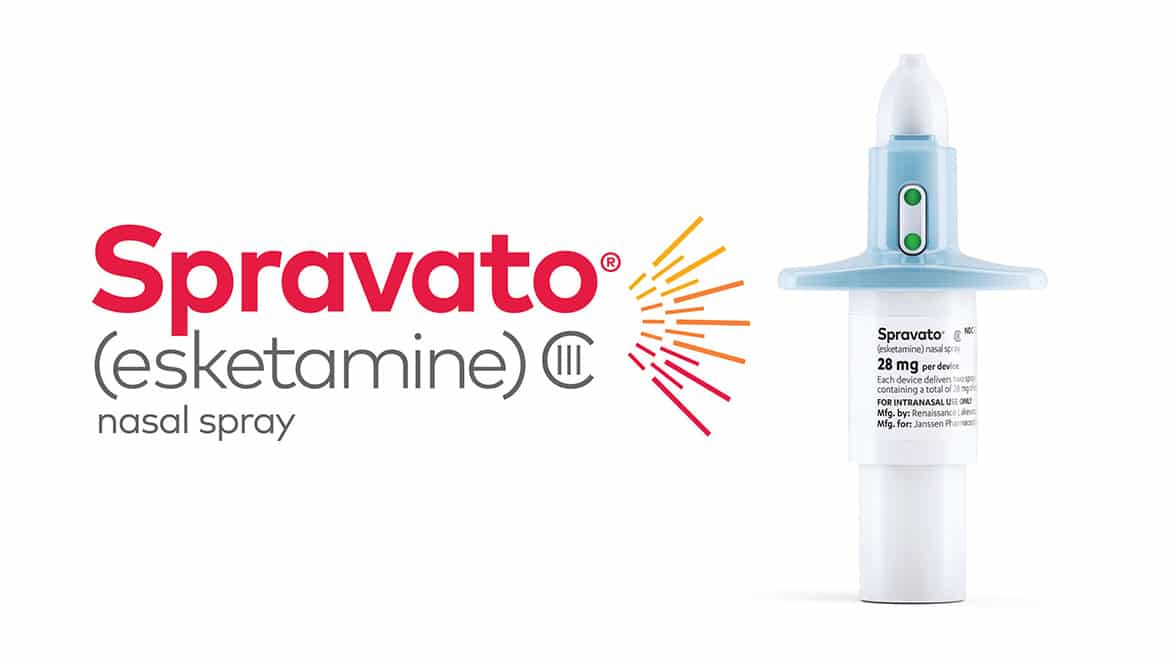Exploring the intersection of ketamine, mental health, and depression reveals a complex narrative filled with potential and caution. Ketamine’s rapid acting oral antidepressant effects have been hailed as revolutionary in treating conditions like major depression and treatment-resistant depression. However, its classification by the Drug Enforcement Administration also points to potential misuse, so it’s essential to work with a professional, licensed treatment center.
In this comprehensive guide, we delve into Spravato (esketamine), an FDA-approved nasal spray derivative of ketamine that’s widely prescribed for treatment-resistant depression. We will explore how it works on brain chemicals like glutamate to alleviate depressive symptoms.
We’ll also address concerns regarding unregulated use of ketamines at clinics and discuss accessibility issues such as insurance coverage for esketamin therapy. This post seeks to furnish you with an extensive knowledge of ketamine’s part in psychological wellbeing and handling depression.
Table of Contents:
- Understanding Ketamine as a Controlled Substance
- Spravato (Esketamine) For Treatment-Resistant Depression
- Mechanism of Action of Ketamine in Treating Depression
- Insurance Coverage and Patient Assistance Programs for Esketamine Therapy
- Unregulated Use of Ketamines at Clinics
- Conclusion
Understanding Ketamine as a Controlled Substance
Ketamine, a controlled substance, is primarily known for use as a surgical anesthetic in the medical field. It’s also recognized by some thrill-seekers who want to experience its trippy “K-hole” effects. However, in a clinical setting, with controled use, it can be a powerful way to combat mental health concerns like suicidal thoughts, major depression, and borderline personality disorder.
The Recreational Use of Ketamine and Its Effects
In the shady world of illicit drug use, ketamine stands out for its mind-bending abilities. Users could experience an out-of-body sensation, as if they are soaring in the stratosphere or completely separated from reality. It’s like a one-way ticket to the Twilight Zone, but be careful not to get lost in the void.
While the idea of escaping reality might sound tempting, remember that high doses of ketamine can send your blood pressure skyrocketing. Seems like not what you had in mind, right?
Side Effects Associated With Ketamine Usage
Aside from the blood pressure rollercoaster, ketamine can bring on a whole bunch of other side effects. We’re talking nausea, numbness, wonky vision, and a foggy brain. Fortunately, the majority of these adverse effects will generally subside within a few hours. But if you abuse this stuff long-term, you might end up with bladder problems or a damaged liver. Yikes.
So, whether you’re considering using ketamine for medical purposes or just for kicks, make sure you know what you’re getting into. It’s not all fun and games, my friend.
Spravato (Esketamine) For Treatment-Resistant Depression
ALl that being said, ketamine, in small doses in a carefully controlled setting have been shown to be incredibly effective in help in lifting the mood and counteracting the symptoms of depression .No question, depression is hard to deal with, but traditional antidepressants can be slow and ineffective. Enter Spravato (esketamine), the new kid on the block approved by the FDA for treatment-resistant depression.
How to Safely Use Spravato
Spravato isn’t your typical pill. It’s a nasal spray that you use under the watchful eye of a healthcare provider, along with your regular antidepressant. Why the supervision? Under the supervision of a healthcare provider, you may feel disoriented and somewhat out-of-sorts after using this nasal spray in combination with your regular antidepressant, so they want to monitor you for a few hours.
Oh, and don’t even think about driving or operating heavy machinery until you’ve had a good night’s sleep. Safety first!
Long-Term Efficacy Questions
Esketamine seems to work like a charm in the short term, but what happens when you stop using it? That’s the big query. A study published in JAMA Psychiatry showed that it helped people with severe suicidal thoughts, but the benefits seemed to fade over time. We need more research on how to keep the good vibes going after treatment.
So, while Spravato can be a game-changer, it’s important to talk to your doctor about the risks and benefits. Your mental health is no joke.
Mechanism of Action of Ketamine in Treating Depression
The precise way ketamine works to treat depression is still being researched, however a plausible hypothesis suggests it may be linked to augmented brain plasticity. Ketamine acts on the glutamate system, a neurotransmitter that plays a crucial role in basic brain function.
The Role of the Glutamate System in Brain Functioning
Glutamate is a neurotransmitter abundant in our brains and regulates various aspects of human cognition, including learning and memory. It’s also been implicated in mood disorders like depression. Research has shown that alterations to this signaling might help alleviate depressive symptoms.
Glutamate has a fascinating capacity for neuroplasticity. Neuroplasticity refers to how neurons can change their structure or function over time due to environmental stimuli or changes within the body itself. By acting upon these systems, ketamine could potentially enhance neuroplasticity, allowing new neural connections to form more easily and improving depressive symptoms.
Hypothesized Mechanism Behind the Antidepressant Action of Ketamine
Ketamine’s antidepressant effects are believed to occur because it blocks NMDA receptors (N-methyl-D-aspartate), inhibiting excessive glutamatergic transmission throughout the brain. Blocking NMDA receptors, which results in increased release of other neurotransmitters such as BDNF, has been suggested to promote neuron growth and survival. Studies have indicated that when administered at low doses under medical supervision, this drug induces rapid-acting antidepressant effects even among individuals who have not responded well to traditional therapies previously.
This effect was initially thought to be solely due to blocking NMDA receptors. However, recent research indicates that additional mechanisms might also play a role in enhancing synaptic connections between neurons, improving overall network functioning within key areas involved in mood regulation, such as the amygdala and hippocampus. Emerging evidence suggests that this multi-faceted approach makes ketamine uniquely effective in combating treatment-resistant forms of depression. Nonetheless, further investigation is required to fully understand the complex interplay of factors contributing to the therapeutic benefits observed following administration.
Ketamine, a drug used in the treatment of depression, may work by increasing brain plasticity through its action on the glutamate system. By blocking NMDA receptors and promoting the release of neurotransmitters like BDNF, ketamine can enhance synaptic connections between neurons and improve overall network functioning in areas involved in mood regulation.
Insurance Coverage and Patient Assistance Programs for Esketamine Therapy
The cost of mental health treatment can be a real downer. But there’s good news! Most insurance providers cover Spravato (esketamine), a promising new way to treat stubborn depression. So you can save some cash and get the help you need.
Accessibility and Affordability Aspects of Esketamine Therapy
Spravato is a nasal spray that’s used with an oral antidepressant, all under the watchful eye of a healthcare provider. It’s like a tag team for your brain.
Fortunately, many insurance providers are willing to help cover the costs of Spravato for those with treatment-resistant depression. They cover Spravato, making it a more affordable option for those battling treatment-resistant depression. Check your insurance plan for details on Spravato coverage.
And that’s not all. Janssen Pharmaceuticals Inc., the makers of Spravato, offer patient assistance programs to make their medication even more affordable. They’ve got your back, even if you don’t have insurance or your plan doesn’t cover everything.
- Janssen CarePath Savings Program: If you’re insured but still face high out-of-pocket costs, this program can help you save big. Check out the Janssen CarePath Savings Program website for more info.
- Janssen Prescription Assistance: If you’re uninsured, you might qualify for free medication through Janssen’s prescription assistance program. Head over to the Janssen Prescription Assistance website for all the deets.
If you’re worried about the cost of esketamine therapy, don’t stress. Reach out to your insurer or the pharmaceutical company for help. They’ve got resources to make sure you can afford this life-changing treatment. Remember, you’re not alone in this journey. There are people out there ready to assist you in navigating the complex world of healthcare financing while battling mental illness.
Most insurance providers cover Spravato (esketamine) for treating stubborn depression, making it a more affordable option. Janssen Pharmaceuticals Inc. also offers patient assistance programs to help with the cost of medication, ensuring that individuals can access this life-changing treatment even if they don’t have insurance or their plan doesn’t cover everything.
Unregulated Use of Ketamines at Clinics
Though ketamine has demonstrated potential in treating depression, its use is not yet approved by the FDA. But hey, hold your horses. It’s not FDA-approved for depression treatment yet. Some clinics are offering treatments using unregulated methods like lozenges. Talk about going off the beaten path.
Risks of Non-Regulated Anti-Depressant Administration
These unconventional methods can be risky if patients aren’t screened properly or if dit is taken without medical supervision. Improper use of ketamine can lead to high blood pressure, dissociation, and altered cognition. Not exactly the side effects you’re looking for, right?
Be aware that the dangers of ketamine don’t just involve physical risks. Using an unregulated dose may not effectively treat depression symptoms or could even make them worse.
To ensure safety and effectiveness, it’s crucial to have professional supervision and controlled conditions when using powerful substances for mental health treatment. Don’t just go to any old clinic, find a reputable one with trained staff who know what they’re doing.
- Screening: Before starting any antidepressant medication, including ketamines, patients should undergo thorough medical screening. Ensure it’s the ideal match for you.
- Dosage Control: The right dosage is key. Too much or too little can mess things up. Let’s get it just right.
- Ongoing Monitoring: Keep an eye on things. Regular check-ups and adjustments are important to ensure the treatment is working and no adverse reactions are happening. Safety check.
If you’re considering alternative treatments for depression, especially ones involving substances like ketamine, do your homework and consult knowledgeable healthcare professionals. Don’t be shy, ask questions.
Looking for a clinic that follows all the necessary precautions and provides high-quality care? Check out Example Clinic in Tennessee. They’ve got you covered.
Some clinics in Knoxville, TN are offering ketamine treatments for depression using unregulated methods like lozenges. However, this can be risky as improper use of ketamine can lead to physical and mental side effects. It is important to find a reputable clinic with trained staff who follow proper screening, dosage control, and ongoing monitoring protocols for safe and effective treatment.
Conclusion
Understanding ketamine as a controlled substance is crucial for mental health treatment.
The FDA-approved medication Spravato (Esketamine) shows promise in treating treatment-resistant depression, but let’s hope it doesn’t break the bank or leave us jumping through insurance hoops.
Kathryn A. Walker is a pioneering medical researcher and psychiatrist known for her groundbreaking work in the field of mental health, particularly in the area of ketamine treatments. With a deep passion for understanding and alleviating the burden of treatment-resistant mood disorders, Kathryn has dedicated her career to investigating the therapeutic potential of ketamine.
Through her relentless efforts, she has played a pivotal role in shedding light on ketamine’s efficacy in treating conditions like depression, anxiety, and PTSD. Her research has not only transformed the way we approach mental health care but has also provided hope to countless individuals who had previously found little relief from conventional treatments.
Kathryn A. Walker’s pioneering contributions continue to shape the landscape of mental health medicine and inspire new avenues of research in the pursuit of better mental well-being for all.






